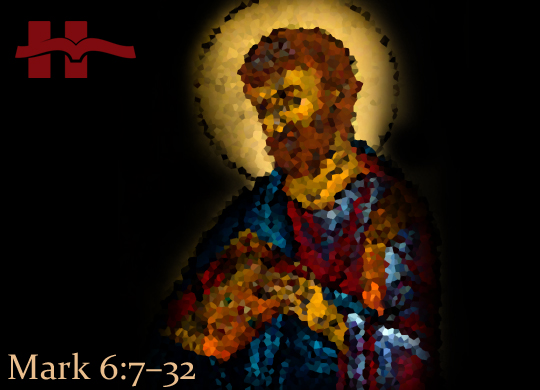Mark 6:7–32

Disciples’ commission from Jesus, that attracts the world’s opposition, is enabled by God’s provision.
And He [Jesus] said to them [his disciples],
“Come away by yourselves to a secluded place and rest a while.”
Mark 6:31
This pericope is another Markan “sandwich” (outer story: 6:7–13 and 6:30–32; inner story: 6:14–29).
Jesus and John are strikingly similar in description: both are reported as raised from the dead (6:14; and 16:6–7), both are “arrested” and “bound” (6:17; and 15:1), both suffer under a reluctant ruler (6:21, 26 and 15:1–15), both are referred to as Elijah (9:11–13 and 6:14–16), and both are buried by disciples (6:29 and 15:42–46). The analogies hint that what happened to John (assassination!) would happen to Jesus.
Notice also the comparison between John and the disciples. Both are “sent” (6:17, 27 and 6:7), both preach repentance (1:4; 6:18 and 6:11, 12), others “hear” both (6:14, 16, 20 and 6:11), and both show up in the wilderness (1:3, 4 and 6:32). But only the fate of John is noted—he loses his life (6:27). So not only does the inner story foreshadow Jesus’ own violent ending, it bespeaks danger for his followers as well. Discipleship is costly!
The outer story (6:7–13, 30–32) is an official sending of the disciples. Thus far they have been merely extras than actors in Jesus’ production; now they get significant roles. They are “sent” (6:7), and they return as “the sent ones” (6:30, “the apostles”). God had “sent” Jesus (9:37; 12:6), and now he was “sending” his disciples.
The dress code noted in 6:8–9 was the garb of the Exodus generation. It is significant that Deut 8:4 and 29:5 promise the durability of these accoutrements throughout the wanderings of the Israelites in the wilderness: God provides! The one undertaking this “Trip of Discipleship” can trust God’s provision for that journey.
Then Mark proceeds to tell us the result of the disciples’ work (6:13)—success! But what about the rejection they were warned about by Jesus (6:11)? Did they have to shake the dust off their feet? The inner story provides the answer.
The assorted incestuous entanglements between members of Herod’s vast family defied precise identification of who was who: Herodias’ daughter, for instance, works out to be Herod Antipas’ niece on her father’s side, his grandniece on her mother’s side, and his own stepdaughter! No wonder John the Baptist excoriated Herod Antipas’ marital arrangements (6:17).
And then for a dancing girl, Herod sacrifices John (6:21–29).
This, Mark warns, is the potential response disciples may encounter when on they are on Jesus’s mission. The “sandwich” thus serves a rhetorical function, hinting at what the disciples may face—consequences that may even be lethal. No, Jesus does not therefore call them to retire from their arduous mission but, encouraged by Jesus (6:30–31), they are to keep on going, as are all of Jesus’ subsequent followers.
John preached, he was rejected, he was killed. Jesus preached, he was rejected, and his death was coming, for what had been done to “Elijah” would be done to the Son of Man (9:12–13). The disciples preached; what might happen to them has now been implicitly pictured. Yet, God’s provision is sufficient, and they are to continue in that strength on the journey of discipleship, as are all those who will one day follow them. And so it will be until the kingdom of God is consummated when Jesus returns—disciples persisting in fulfilling their commission despite opposition.











 Abe Kuruvilla is the Carl E. Bates Professor of Christian Preaching at The Southern Baptist Theological Seminary (Louisville, KY), and a dermatologist in private practice. His passion is to explore, explain, and exemplify preaching.
Abe Kuruvilla is the Carl E. Bates Professor of Christian Preaching at The Southern Baptist Theological Seminary (Louisville, KY), and a dermatologist in private practice. His passion is to explore, explain, and exemplify preaching.